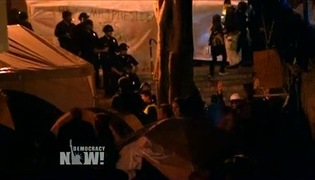
Related
Guests
- Gabor MatéVancouver, Canada-based physician and bestselling author of four books, including When the Body Says No: Understanding the Stress-Disease Connection. His latest book is In the Realm of Hungry Ghosts: Close Encounters with Addiction.
On a trip from Vancouver, Dr. Gabor Maté stopped by Occupy Wall Street on Monday. He observed: “50 percent of American adults have a chronic medical illness, and much of that has to do with stress. And if you look at the literature on what causes stress, it’s uncertainty and lack of information and loss of control and lack of expression of self. And the uncertainty that has been forced upon the American population by the recent economic crisis, the loss of control as power has flown into the hands of very, very few people, and the absolute powerlessness of the many in the face of all that, and the lack of expression through the ordinary political process, people are totally disempowered and deprived of their voice. This protest addresses all those issues. So I can only say that this is an extraordinarily healthy thing to happen. People who participate here will be healthier for it as a result, and maybe society, in general, as well.” [includes rush transcript]
Transcript
AMY GOODMAN: It’s getting dark here at Zuccotti Park, at Liberty Plaza. Thousands of people are here. There’s going to be a general assembly in a few minutes. Among those who are going to be addressing them are John Carlos, who is very famous for the famous Olympic salute in Mexico City. We’ll talk about that in a minute. But right now we’re joined by none other than Gabor Maté, Gabor Maté who is known to Democracy Now! listeners and viewers for his many books—among them, In the Realm of Hungry Ghosts: Close Encounters with Addiction; Scattered, about attention deficit disorder and what you can do about it; looking at the mind-body connection, a book called When the Body Says No.
And so, I guess the question here today, Dr. Gabor Maté, you’ve come from Vancouver, from Canada. Why are you here at Liberty Plaza?
DR. GABOR MATÉ: Well, I happen to be in New York speaking to a number of groups on addictions and stress and child development. But I could not stay away from this place. As somebody who reached political consciousness in the 1960s, just when John Carlos did his famous salute at the Olympics, it’s gratifying to see that the thirst and the demand for justice and power and people’s rights wasn’t restricted to one generation or one time only but is very much alive in America. It’s wonderful to see that.
AMY GOODMAN: So, you’re a physician who deals with issues like addiction. In fact, that’s why you’re in New York. You’re going to be addressing people. But what does that have to do with Occupy Wall Street? Why else is it so exhilarating for you today?
DR. GABOR MATÉ: Well, you know, among the many inequities in a society are the ones that this protest has brought to light, the inequitable distribution of wealth and power. But what is not so generally realized, that this society also makes people sick. Fifty percent of American adults have a chronic medical illness, and much of that has to do with stress. And if you look at the literature on what causes stress, it’s uncertainty and lack of information and loss of control and lack of expression of self. And the uncertainty that has been forced upon the American population by the recent economic crisis, the loss of control as power has flown into the hands of very, very few people, and the absolute powerlessness of the many in the face of all that, and the lack of expression through the ordinary political process, people are totally disempowered and deprived of their voice. This protest addresses all those issues. So I can only say that this is an extraordinarily healthy thing to happen. People who participate here will be healthier for it as a result, and maybe society, in general, as well.
And one more thing, as well. There was a study just this morning that parents who are stressed, they’re not as tuned in to their kids. They’re not as connected to their kids. So when society stresses people, like the current economic uncertainty and crisis does, children are not getting what they need. So this protest, as well, speaks to the needs of children as much as to the needs of adults in general. So that’s why I’m so gratified to see all this.
AMY GOODMAN: Is Canada paying attention?
DR. GABOR MATÉ: It’s paying attention to the media, and there’s some talk of similar protests in Canada. It hasn’t happened yet, but it well might, and it well should, really.
AMY GOODMAN: And how has the corporate media covered this in Canada?
DR. GABOR MATÉ: Well, in the beginning, it was like up here: it was ignored. But now they begin to pay attention to it. To tell you the truth, I don’t pay so much attention to the Canadian media these days, so I can’t really comment on how they’re covering it. But it’s nice to see that the American media, at least now, has begun to see some—pay some serious attention. And there was a wonderful column the other day in the New York Times by Paul Krugman, the Nobel Prize winner, that really honored the protest for what it is.
AMY GOODMAN: Well, I want to thank you very much.












Media Options